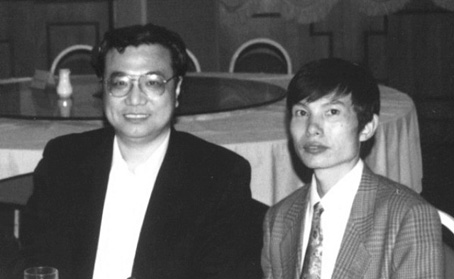Guo Jia (Country), by Jackie Chan and Liu Yuanyuan, premiere February 28, 2009 in Beijing.
MV 2.
This is a substantially different Music Video rendition of the 2009 Jackie Chan song "Guo Jia" (Country). It features many ordinary families from all over China. As always, it is the faces of many, many anonymous individuals that touches the soul.
国家
词:金培达
曲:王平久
唱:成龙、刘媛媛
一玉口中国 一瓦顶成家
都说国很大 其实一个家
一心装满国 一手撑起家
家是最小国 国是千万家
在世界的国 在天地的家
有了强的国 才有富的家
国的家住在心里 家的国以和矗立
国是荣誉的毅力 家是幸福的洋溢
国的每一寸土地 家的每一个足迹
国与家连在一起 创造地球的奇迹
一心装满国 一手撑起家
家是最小国 国是千万家
在世界的国 在天地的家
有了强的国 才有富的家
国的家住在心里 家的国以和矗立
国是荣誉的毅力 家是幸福的洋溢
国的每一寸土地 家的每一个足迹
国与家连在一起 创造地球的奇迹
国是我的国 家是我的家
我爱我的国 我爱我的家
国是我的国 家是我的家
我爱我的国 我爱我的家
(国爱万家 我爱国家)
MV 3.
This is a song with exactly the same title, "Guo Jia" (Country), although the "country" here refers to the Republic of China (Taiwan). I find the song with a little bit of a Russian folk song flavor (which is a little bit ironic), but perhaps not surprising since the composer, Liu Qichang was born in 1941; and perhaps shouldn't even be ironic at all because Sun Yat-sen (1866-1925, "Father of the Nation," the only politician revered in both mainland China and Taiwan, the central figure in this MV) adopted the policy of taking Russia as an ally during his final years, in the 1920s.
The tune and lyrics of this song are extremely touching, if the listener with PRC background could hear beyond the one politically sensitive phrase in the last sentence (which I took the liberty to withhold). Another irony here is that the singer, 張帝, who gave a splendid performance of this very serious and solemn song, is more widely known as a comedian-singer.
國家
詞:劉家昌 (1941-)
曲:劉家昌
唱:張 帝 (1942-)
沒有國哪裏會有家, 是千古流傳的話,
多少歷史的教訓證明失去國家多可怕。
炎黃子孫用血和汗, 把民族的根紮下,
多少烈士獻出生命, 培育出自由的花。
國家, 國家, 我愛的大中華,
四海之內的中國人永遠在青天白日下。
沒有國哪裏會有家, 是萬世不變的話,
當你踏上別人的土地才知道更需要它。
在風雨中使我有信心, 就是我的國家,
苦難中把我撫養長大, 也是我的國家。
國家, 國家, 我愛的大中華,
四海之內的中國人永遠在青天白日下!
*劉家昌其他作品
夢駝鈴、月滿西樓、庭院深深、一簾幽夢 等2000多首歌曲
電影《晚秋》等
為歌迷所熟知的鄧麗君、鳳飛飛、劉文正、費玉清、甄妮、
Source: http://www.hudong.com/wiki/刘家昌





